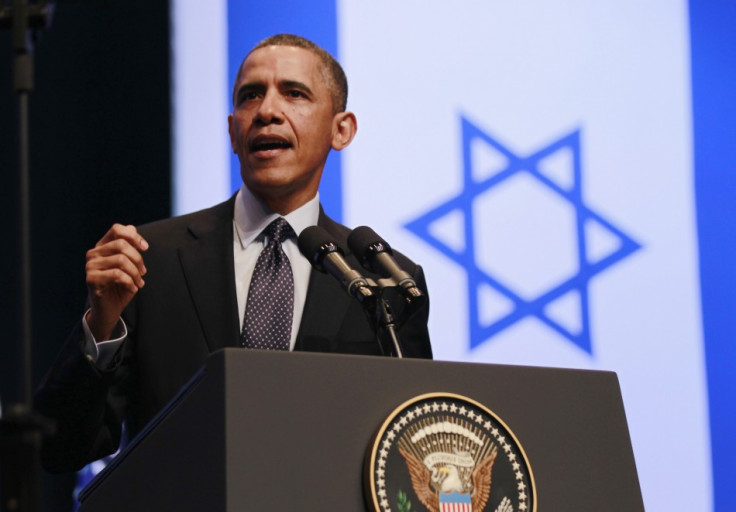Barack Obama's Jerusalem Speech is Subtle Rhetoric Directed at Israeli People
Bolder US president has Israelis applauding idea that Palestinian condition is unjust

Ahead of his visit to Israel, US president Barack Obama made no mystery that his speech at the Jerusalem Convention Centre (JCC) before 600 young students would be the key moment of the tour.
And here it was. A more confident, sharper Obama delivered a terrific, subtle and eloquent speech that future generations will probably analyse as a pivotal point in the construction of peace in this tormented region. Until this moment, he had kept a low profile. He did not bring any proposals for a political solution to the Israeli-Palestinian conflict. Prior to his arrival, he announced that he was planning to listen rather than lecture during his visit.
The initial remarks at Ben-Gurion international airport in Tel Aviv were all focused on reassuring the elite of the United States' eternal support for the Jewish state, in a heart-felted re-evocation of Israel's millenary connection to the Promised Land. The speech at the JCC started in the same tone.
As many commentators pointed out, Obama's main purpose on his visit was to "communicate directly with the Israeli public" and establish a symbolic and emotional link.
At the start of his speech, Obama admitted: "What I've looked forward to the most is the ability to speak directly to you, the Israeli people - especially so many young people."
It was not surprising, then, to have seen many references to Abraham, the Jewish diaspora, the Holocaust, the Zionist dream, intertwined with words in Hebrew and mention of the courage of the IDF, the Israeli Defence Force. It was equally unsurprising to hear Obama taking a strong stance against the enemies of Israel: Iran and Hezbollah.
Peace among peoples
But it was in the second part of his speech that Obama mades some brave, albeit not groundbreaking, remarks. Bypassing Bibi Netanyahu and his pro-settler government coalition, the US president used the same tools of Zionism to preach a possible peace with the Palestinians. He cited David Grossman and father of Zionism Ben Gurion to outline a sort of arithmetical equation between the existence of the state of Israel and peace with Palestinians.
"Peace must be made among peoples, not just government," was an obvious but nonetheless courageous stand for someone who had just spent four hoursin discussions with Netanyahu.
Obama then urged Israel to "reverse an undertow of isolation", perhaps giving credit to the renewed boldness of international bodies such as the UN, which slammed the settlements.
Let's be frank: Obama will never accept Palestinians' unilateral efforts at the United Nations but the recognition of the "Palestinian people's right to self-determination and justice" to cheering and enthusiastic applause of his audience is worth a mention.
As in other speeches, Obama was at his best when he went off-script. "Put yourself in their shoes - look at the world through their eyes," he asked the all-Israeli audience.
"It is not fair that a Palestinian child cannot grow up in a state of her own, and lives with the presence of a foreign army that controls the movements of her parents every single day," he continued. "It is not just when settler violence against Palestinians goes unpunished.
"It is not right to prevent Palestinians from farming their lands; to restrict a student's ability to move around the West Bank; or to displace Palestinian families from their home. Neither occupation nor expulsion is the answer.
"Just as Israelis built a state in their homeland, Palestinians have a right to be a free people in their own land."
It might easily be the strongest words used by a US president to condemn the Israeli policy of daily violation of Palestinians' human rights, given in a "hostile" audience. But the young Jewish audience burst into cheers and shouts when Obama delivered those points.
Revolutionary step
"On settlements and policy, Obama is reaching around Bibi, who is an impediment to peace, to the Israeli public directly," tweeted New York Times columnist Nicholas Kristof. Obama also said that Palestinian Authority president Mahmoud Abbas and prime minister Salam Fayyad were "true partners" who had built institutions and maintained security on the West Bank.
But perhaps the most "revolutionary" step was reached when Obama almost recycled his 2008 presidential campaign's slogan of "change" and called on Israelis to challenge their leaders over the peace process.
"Speaking as a politician, I can promise you this: political leaders will not take risks if the people do not demand that they do. You must create the change that you want to see," he said.
This position is likely to irritate Netanyahu, whose newly formed government was an expression of the victory of the status quo.
As David Rothkopf, CEO of Foreign Policy noted on Twitter: "Bibi must be thanking his lucky stars there are no Israeli politicians like Barack Obama. If there were, he'd be doing commentary on CNN now."
© Copyright IBTimes 2025. All rights reserved.






















